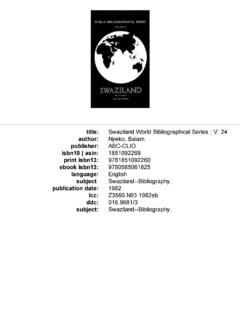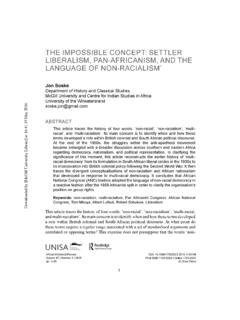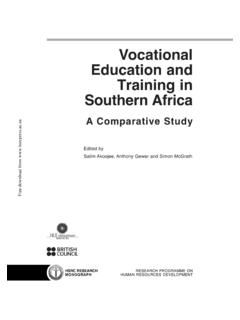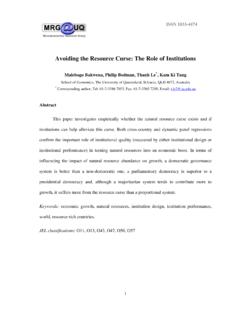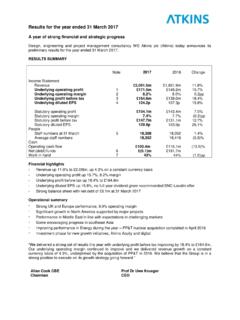Transcription of POST-APARTHEID SOUTHERN AFRICA
1 POST-APARTHEID SOUTHERN AFRICA After decades of economic decline and political instability, the SouthernAfrican region has engaged in a process of rapid and far-reaching politicaland economic changes. This development has been reinforced by SouthAfrica s transition from apartheid , a transition which has created optimisticexpectations not only for that country but also for the SOUTHERN Africanregion as a whole. POST-APARTHEID SOUTHERN AFRICA brings together some ofthe best-known, most highly regarded academics in the field to present atimely and comprehensive review of the prospects for economic integrationand development in SOUTHERN AFRICA , and to analyse alternative strategiesand policies for the volume is divided into three parts. The first section discusses economicpolicy in contemporary South AFRICA , and focuses on the many and diverseproblems and expectations facing the new government. Part II examines theissues of regional integration and structural adjustment that have beenpromoted simultaneously as two separate and complementary facets of therevival and acceleration of development.
2 Papers in this section also explorelabour market issues and the dynamic role of small enterprises in thedevelopment of SOUTHERN AFRICA . The third part of the volume presents in-depth country-specific studies of Botswana, Lesotho, Mauritius, Mozambiqueand Tanzania, presenting critical analysis of policy and development issuesand discussing the experience of each country in pursuing particulardevelopment SOUTHERN AFRICA is a valuable and topical study which offersa comprehensive and much-needed analytical overview of the extraordinarychallenges now facing the region. It will have wide appeal to academics Petersson is Senior Lecturer in Economics at the University of Lundin Sweden. ROUTLEDGE STUDIES IN DEVELOPMENTECONOMICS economic DEVELOPMENT IN THE MIDDLE EASTR odney WilsonMONETARY AND FINANCIAL POLICIES IN DEVELOPINGCOUNTRIESG rowth and stabilizationAkhtar Hossain and Anis ChowdhuryNEW DIRECTIONS IN DEVELOPMENT ECONOMICSG rowth, environmental concerns and government in the 1990sEdited by Mats Lundahl and Benno LIBERALIZATION AND INVESTMENTK anhaya and Robert LensinkLIBERALIZATION IN THE DEVELOPING WORLDI nstitutional and economic changes in Latin America.
3 AFRICA and AsiaEdited by Alex Jilberto and Andr MommenFINANCIAL DEVELOPMENT AND economic GROWTHT heory and experiences from developing countriesEdited by Niels Hermes and Robert LensinkTHE SOUTH AFRICAN ECONOMYM acroeconomic prospects for the medium termFinn Tarp and Peter BrixenPUBLIC SECTOR PAY AND ADJUSTMENTL essons from five countriesEdited by Christopher ColcloughEUROPE AND economic REFORM IN AFRICAS tructural adjustment and economic diplomacyObed SOUTHERN AFRICAE conomic challenges and policies for the futureEdited by Lennart Petersson post -APARTHEIDSOUTHERN AFRICA economic challenges and policiesfor the futureProceedings of the 16th Arne Ryde Symposium23 24 August 1996, Lund, SwedenEdited byLennart Petersson London and New YorkFirst published 1998by Routledge11 New Fetter Lane, London EC4P 4 EESimultaneously published in the USA and Canadaby Routledge29 West 35th Street, New York, NY 10001 1998 Lennart PeterssonRoutledge is an imprint of the Taylor & Francis GroupThis edition published in the Taylor & Francis e-Library, rights reserved.
4 No part of this book may be reprinted orreproduced or utilised in any form or by any electronic,mechanical, or other means, now known or hereafterinvented, including photocopying and recording, or in anyinformation storage or retrieval system, without permission inwriting from the Library Cataloguing in Publication DataA catalogue record for this book is available from the British LibraryLibrary of Congress Cataloguing in Publication DataArne Ryde Symposium (16th:1996: Lund, Sweden) POST-APARTHEID SOUTHERN AFRICA : economic challenges and policies for the future:proceedings of the 16th Arne Ryde Symposium, 23 24 August 1996, Lund, Sweden/edited by Lennart bibliographical references and AFRICA , SOUTHERN economic integration Congresses. 2. AFRICA , SOUTHERN economic policy Congresses. 3. AFRICA , SOUTHERN economic conditions 1975 Congresses. 4. South AFRICA Economicpolicy Congresses. I. Petersson, Lennart, 1942.
5 II. 6 dc2197 23353 CIPISBN 0-203-41154-4 Master e-book ISBNISBN 0-203-71978-6 (Adobe eReader Format)ISBN 0-415-16184-3 (Print Edition)v CONTENTS List of tablesviiList of figuresixList of contributorsxiList of acronymsxiiiPrefacexvii1 Introduction1 LENNART PETERSSONPART ISouth African transition2 The POST-APARTHEID economy, and after?21 MATS LUNDAHL3 Changing patterns of inequality in the South Africanlabour market44 NICOLI NATTRASS AND JEREMY SEEKINGS4 South African trade and industrial policy in a regionalcontext64 COLIN MCCARTHYPART IIRegional studies5 Trade integration and economic development: someSouthern African issues89 GAVIN MAASDORPCONTENTSvi6 Regional integration and cereal trade107 JOHN WEEKS AND TURAN SUBASAT7 The dynamic role of micro and small enterprises inSouthern Africa125 CARL LIEDHOLM AND DONALD MEAD8 Is SOUTHERN AFRICA ready for regional monetaryintegration?145 CAROLYN JENKINS AND LYNNE THOMAS9 Structural adjustment and tradables: a comparative studyof Zambia and Zimbabwe171 JOHN WEEKS AND PAUL MOSLEY10 Labour market policies and outcomes in post -independenceZimbabwe: lessons for South Africa201 JOHN KNIGHTPART IIIC ountry studies11 The impact on Botswana s economic prospects of theending of apartheid227 CHARLES HARVEY12 Localization and integration between unequal partners:policy implications for Lesotho239 LENNART PETERSSON13 Trade liberalisation in Mauritius: efficiency gains andlabour market effects267 CHRIS MILNER AND GEOFFREY REED14 Mozambique: macroeconomic performance and criticaldevelopment issues288 FINN TARP AND MORTEN IGEL LAU15 Debt relief and structural adjustment in Tanzania311 ANDERS DANIELSONI ndex329vii AFRICA .
6 Country profiles and and expanded unemployment amongst men and African trade with countries in the foreign trade, 1992 tariff rates, imports of cereals, 1961 imports of cereals, excluding wheat, 1961 variations by crop: significant correlationsbetween countries of changes in production and of micro enterprises in SOUTHERN MSE new starts rate by initial determinants of MSE survival and employment growth of existing small enterprisesalternative performance and policy stance GDP per capita relative to the SADC average,1960 of countries across states , I960 and GDP per capita relative to the SACU average,1960 policy stance indicators SADC structure of earnings, Zambia and Zimbabwe, : labour force and formal-sector expenditure and food crop production,1980 and export diversification, 1970 of policy regimes, Zambia, 1970 of policy regimes, Zimbabwe, 1970 , relative productivity trends, 1970 explaining relative performance in adjustmentin Zambia and catalysts of adjustment growth in Botswana, before and liberalisation pattern of assistance to rates of effective protection in the Mauritianmanufacturing sector, 1980 and and composition of Mauritian trade,1979 of employment and real wage changes overreform, 1979 in Mauritius, 1979 Sectoral employment and real wages, 1977 domestic domestic product by changes in gross domestic product by changes in gross domestic product by and import of services and net factor and the current external receipts and macroeconomic indicators, FY1976 indicators.
7 Severely indebted low-income countries(SLICs), Sub-Saharan AFRICA (SSA) and foreign exchange government budget, FY1991 FY1995322ix FIGURES Employment and capital stock ratios in South Africanmanufacturing, 1960 Standard deviation of log of per capita income: Standard deviation of log of per capita income: Standard deviation of log of per capita income: The relationship between per capita income in I960 andsubsequent growth: The relationship between per capita income in 1960 andsubsequent growth: Zambia and Zimbabwe: growth rates of GDP,1970 Zambia: exports, imports and trade balance of goodsand services, 1970 1994 (current US$) Zambia: exports, imports and trade balance of goodsand services, 1970 1994 (constant US$, 1987) Zambia: agricultural and manufacturing prices relative tonon-tradables, 1970 Zimbabwe: exports, imports and trade balance of goodsand services, 1970 Zimbabwe: relative prices of tradables to non-tradables,1970 Zimbabwe: growth rates of output of tradable andnon-tradable sectors, 1971 Zimbabwe: shares of employment in tradable sectors,1971 Zimbabwe: marginal output/labour ratios,1972 Zimbabwe: percentage changes in the manufacturingmarginal output/labour ratio and the product wage,1972 Zimbabwe: percentage changes in the manufacturingproduct- and consumer wage, 1972 Zimbabwe.
8 Percentage changes in product wages in tradable(agriculture and manufacturing) and non-tradable sectors,1971 The effects of wage policy on economic Geographic concentration between two countries ofdifferent Growth of factor income, customs union revenue andtrade, 1972 Basotho mine migrants, real mine wages and real basicminimum wage, 1969 The initial labour market The effects of reducing the tariff on Expanding non-traditional exportables when there is aminimum Broad level and structure of employment, 1968 Employment by gender in Average real wages in manufacturing by sector,1968 Real wages relative to those in textiles/clothing,1968 The Debt Relief Laffer Curve313xi CONTRIBUTORS Anders Danielson, Associate Professor of Economics, School of Economicsand Management, University of Lund, SwedenCharles Harvey, Professorial Fellow, Institute of Development Studies,University of Sussex, UK; currently seconded as a Senior Economist toBotswana Institute of Development Policy Analysis, GaboroneCarolyn Jenkins, Research Officer, Centre for the Study of AfricanEconomies, University of Oxford.
9 Research Associate, Centre forResearch into Economics and Finance in SOUTHERN AFRICA , LondonSchool of Economics, UKJohn Knight, Professor of Economics, Centre for the Study of AfricanEconomies, Institute of Economics and Statistics, University of Oxford,Fellow of St Edmund Hall, UKMorten Igel Lau, Research Associate, Department of Economics,University of Copenhagen, DenmarkCarl Liedholm, Professor of Economics, Michigan State University,USAMats Lundahl, Professor of Development Economics, Stockholm School ofEconomics, SwedenGavin Maasdorp, Director, economic Research Unit, University of Natal,South AfricaColin McCarthy, Professor of Economics, University of Stellenbosch,South AfricaDonald Mead, Professor of Economics, Michigan State University, USAC hris Milner, Professor of International Economics, University ofNottingham, UKPaul Mosley, Professor of Economics, University of Reading, UKCONTRIBUTORSxiiNicoli Nattrass, Associate Professor of Economics, School of Economics,University of Cape Town, South AfricaLennart Petersson, Senior Lecturer of Economics, School of Economics andManagement, University of Lund, SwedenGeoffrey Reed, Senior Lecturer of Economics, University of Nottingham,UKJeremy Seekings, Senior Lecturer of Sociology, University of Cape Town,South AfricaTuran Subasat, Researcher, Centre for Development Policy Research, Schoolof Oriental and African Studies, University of London, UKFinn Tarp, Associate Professor of Economics, University of Copenhagen,DenmarkLynne Thomas, Researcher, Centre for Research into Economics andFinance in SOUTHERN AFRICA , London School of Economics, Universityof London, UKJohn Weeks, Professor of Development Economics, Centre forDevelopment Policy Research, School of Oriental and African Studies,University of London.
10 UKxiii ACRONYMS ACPA frica, Caribbean and Pacific Group of StatesADBA frican Development BankANCA frican National CongressAPECAsia Pacific economic CooperationASEANA ssociation of South-East Asian NationsBEDCOB asotho Enterprise Development CorporationBLNSB otswana, Lesotho, Namibia, Swaziland (also called BLSN)BLSB otswana, Lesotho and SwazilandBWIB retton Woods InstitutionsCBIC ross-Border InitiativeCBLC entral Bank of LesothoCEAOWest African economic CommunityGETC ommon External TariffCMAC ommon Monetary Area (SACU members minusBotswana)COMESA Common Market for Eastern and SOUTHERN AfricaCOSATUC ongress of South African Trade UnionsCSOC entral Statistical OfficeCSSS outh AFRICA Central Statistical ServicesDCDevelopment CertificationDIDevelopment Incentives ActDRLCDebt Relief Laffer CurveEGAU nited Nations economic Commission for AfricaECLACU nited Nations economic Commission for Latin Americaand the CaribbeanECOWAS economic Community for West African StatesEDTT otal Debt StockEFTAE uropean Free Trade AssociationEIUE conomist Intelligence UnitEMCOZE mployers Confederation of ZimbabweEMSE uropean Monetary SystemEMUE uropean Montary UnionACRONYMSxivEPZE xport Processing ZoneERME xchange Rate MechanismERPE conomic Rehabilitation Programme.
